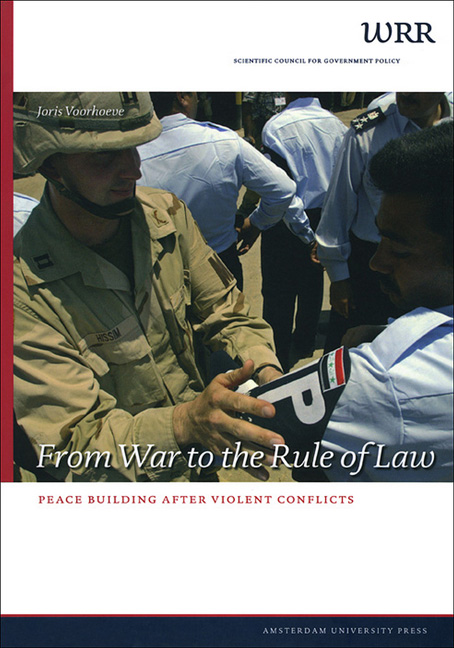Book contents
- Frontmatter
- Dedication
- Contents
- Preface
- 1 Why this Study?
- 2 An Overview of Peacebuilding
- 3 Towards Typology and Theory
- 4 (Re) Establishing Order
- 5 (Re) Building the Rule of Law
- 6 Resources and Costs
- 7 The European Union and Post-Conflict Peacebuilding
- 8 Conclusions and Recommendations
- List of Country Illustrations, Tables, Text Boxes and Maps
- Acknowledgments
- Further Reading
- Some Relevant Websites
7 - The European Union and Post-Conflict Peacebuilding
Published online by Cambridge University Press: 14 January 2021
- Frontmatter
- Dedication
- Contents
- Preface
- 1 Why this Study?
- 2 An Overview of Peacebuilding
- 3 Towards Typology and Theory
- 4 (Re) Establishing Order
- 5 (Re) Building the Rule of Law
- 6 Resources and Costs
- 7 The European Union and Post-Conflict Peacebuilding
- 8 Conclusions and Recommendations
- List of Country Illustrations, Tables, Text Boxes and Maps
- Acknowledgments
- Further Reading
- Some Relevant Websites
Summary
INTRODUCTION
After the exploration of peacebuilding in the previous chapters, it is useful to look specifically at the policies and instruments of the European Union. It may be the largest source of assistance for rule-of-law support activities in the foreseeable future. The European Union and its members have already become the largest source of bilateral and multilateral assistance in the world for development, humanitarian, emergency and peacebuilding programmes.
This chapter explores how its members have empowered the EU to play a role in peacebuilding since the 1990s. Even though the EU and its members form the main source of funds, their activities are still fragmented. The EU and many of its members still lack much influence on peacebuilding in recipient states, because of the weakness of the Common Foreign and Security Policy (CFSP) of the EU and a lack of coherence of the activities of individual member states in some recipient countries.
POLICY AND INSTITUTIONS
THE ESTABLISHMENT OF A COMMON FOREIGN AND SECURITY POLICY
The member states of the European Union (EU) have aspired to coordinate elements of their foreign policies since the 1970s. The first efforts in the 1970's and 80's were motivated particularly by the wish to play a role in the conflicts among Israel, the Palestinians and Arab countries, as well as a desire to reduce dependence of EU countries on the us. But it was not until the early 1990s – when Germany had just been unified and the Soviet bloc had collapsed – that coordination of foreign policies became more than just an aspiration. Members desired a common foreign and security policy in particular to help guide the developments in Central and Eastern Europe. Even though the EU was not very successful in this area in the 1990’s, the tasks ahead encouraged further cooperation. Since the us presidency of G.W. Bush and the intervention of the us and Britain in Iraq, the desire of the EU members for more intense EU foreign policy cooperation has grown further.
The Common Foreign and Security Policy (CFSP) was already introduced in the Maastricht Treaty of the European Union (TEU), which came into force in 1993.
- Type
- Chapter
- Information
- From War to the Rule of LawPeace Building after Violent Conflicts, pp. 147 - 166Publisher: Amsterdam University PressPrint publication year: 2007



